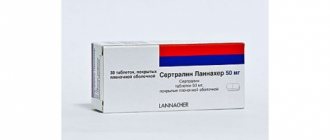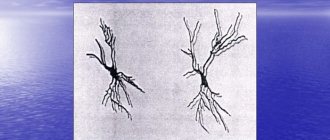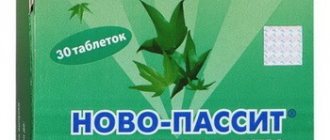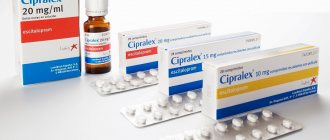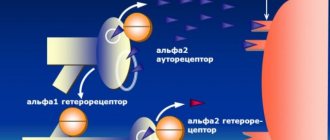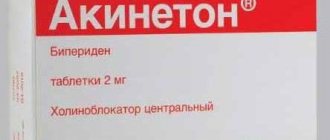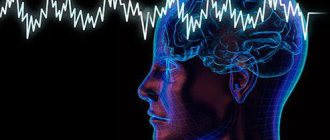Ludiomil is a drug (concentrate) that corresponds to the psychoanaleptic group. The instructions for use highlight the following features of the medicine:
How to dissolve vascular plaques, normalize blood circulation, blood pressure and forget the way to the pharmacy
- Sold only with a doctor's prescription
- During pregnancy: with caution
- When breastfeeding: contraindicated
- In childhood: with caution
- For liver dysfunction: contraindicated
- If renal function is impaired: contraindicated
- In old age: with caution
Pharmacodynamics and pharmacokinetics
The drug Ludiomil belongs to tetracyclic antidepressants and non-selective monoamine reuptake inhibitors, which additionally have therapeutic properties similar to tricyclic antidepressants. When taking it, it was noted: a significant improvement in mood, elimination of anxiety, agitation and psychomotor retardation . Treatment of masked depression has a beneficial effect on somatic symptoms.
Long-term use of the drug may affect the functional state of the neuroendocrine system, for example, hormones , melatonin or the endorphinergic system, as well as the neurotransmitter : serotonin, norepinephrine, gamma-aminobutyric acid.
After injection, the drug is quickly distributed in the body, tightly binding to plasma proteins. Metabolism results in the formation of several metabolites . Excretion occurs mainly through the kidneys, in the form of metabolites.
Indications
- endogenous and involutional depressions;
- psychogenic,
- reactive and neurotic depression,
- exhaustion depression;
- somatogenic depression;
- masked depression;
- menopausal (menopausal) depression;
- other depressive mood disorders,
- characterized by anxiety,
- dysphoria or irritability; state of apathy (especially in old age); complaints of a psychosomatic or somatic nature in patients with depression and/or anxiety.
Contraindications for use
This drug is not prescribed to patients with:
- hypersensitivity to it and other tricyclic antidepressants;
- diseases accompanied by convulsive syndrome or a reduced threshold of convulsive readiness, such as brain lesions of various etiologies and alcoholism;
- acute stage of myocardial infarction and intracardiac conduction disorders;
- severe dysfunction of the liver or kidneys;
- angle-closure glaucoma or urinary retention;
- acute poisoning with alcohol, psychotropic and sleeping pills.
Also, Ludiomil is not prescribed to patients under 18 years of age.
There is a large list of features when treatment must be carried out with increased caution. Therefore, it is contraindicated to use this drug on your own.
special instructions
According to the standard classification of mental illnesses in the Diagnostic and Statistical Manual of Mental Disorders - DSM-IV and the International Statistical Classification of Diseases - ICD-10, the conditions listed in the “Indications” section are defined as follows: depressive episode, recurrent depressive disorder or major depression.
In patients with schizophrenia, during treatment with tricyclic antidepressants, psychotic symptoms may worsen; also, in cyclic bipolar disorders, manic or hypomanic episodes were observed in the depressive phase of the disease (during treatment with tricyclic antidepressants). If such complications develop, it may be necessary to reduce the dose of maprotiline, including discontinuation, and prescribe antipsychotics.
The increased likelihood of suicidal behavior in severe depression may persist until significant remission occurs. Both children and adults with depression may experience suicidal behavior and/or increased depression, as well as other psychopathological symptoms, regardless of whether they are receiving antidepressants or not. Short-term studies of pediatric and adolescent patients diagnosed with depression and other psychiatric disorders have found that taking antidepressants may increase the risk of suicidal behavior and suicidal ideation. Rarely, antidepressants may cause an exacerbation of suicidal tendencies (intentions).
At all stages of therapy, careful monitoring of patients taking the drug for any indication is required. The clinical picture should also be studied for worsening of the condition, suicidal behavior and other psychopathological symptoms, especially at the beginning of the course or when adjusting the dosage. It is necessary to consider the possibility of changing the treatment regimen, including discontinuation of Ludiomil, especially if such changes appeared suddenly, were pronounced or were not noted before taking the drug.
The main task when using Ludiomil is to achieve a therapeutic effect using the drug in the lowest effective dose. This is especially significant for adolescents, patients over 18 years of age with incomplete growth processes and the elderly. These categories of patients usually have an unstable autonomic nervous system and a more pronounced reaction to maprotiline.
Electroconvulsive therapy during the use of Ludiomil can only be carried out under close medical supervision.
There is some evidence of changes in the number of leukocytes in the peripheral blood during therapy with Ludiomil, and therefore periodic monitoring of this indicator is necessary, and special attention is also required in relation to symptoms such as sore throat or fever. It is most important to follow these recommendations in the first months of therapy and during long-term treatment, during which additional monitoring of kidney and liver function indicators should be carried out.
If there is a history of increased intraocular pressure, severe chronic constipation or urinary retention, especially in the case of prostatic hypertrophy, maprotiline is recommended to be used with caution. Since Ludiomil has some effects characteristic of tricyclic antidepressants, which can, for example, contribute to the development of paralytic ileus (especially in the elderly or in hospital patients), it should be used with caution, and appropriate measures should be taken if constipation occurs. The anticholinergic effect inherent in tricyclic antidepressants cannot be excluded: a decrease in tear production and a relative increase in the amount of mucus in the tear fluid, which can contribute to damage to the corneal epithelium when wearing contact lenses.
In hyperthyroidism, as well as in patients taking thyroid hormone medications, due to the possibility of an increased incidence of side effects from the cardiovascular system, the drug should be used with caution.
Long-term therapy with antidepressants can cause dental caries, therefore, during treatment with Ludiomil, it is recommended to systematically undergo sanitation at the dentist.
It is necessary to warn the anesthesiologist about the use of Ludiomil before performing local or general anesthesia. Continuing the course of maprotiline therapy is safer compared to the problems that may arise due to abrupt discontinuation of the drug immediately before surgery. Relatives and guardians of both children and adults taking antidepressants (regardless of indications) should be warned that patients require constant monitoring due to the risk of other psychopathological symptoms, including suicidal behavior, of which the attending physician should be immediately notified.
Side effects
When treated with Ludiomil, transient or mild negative effects may develop. They usually go away after stopping the drug or adjusting the dosage.
Often, undesirable effects can coincide with the symptoms of the underlying disease, so recognizing them is quite difficult. The most common side effects are: feeling tired, agitation, sleep disturbances, anxiety, constipation, dry mouth, headaches, tremors and others. Therefore, when during treatment there is an increase in symptoms characteristic of a depressive state, it is necessary to exclude the possibility of the development of undesirable actions.
There are also disturbances in the activity of the cardiovascular, digestive, endocrine, respiratory and other systems and organs.
Pregnancy
Experimental studies have shown that the drug Ludiomil® does not have a teratogenic or mutagenic effect; it does not cause fertility disorders and did not have a negative effect on the fetus. However, the safety of the drug in humans during pregnancy has not yet been established. There are isolated reports of a possible relationship between the use of the drug Ludiomil® and undesirable effects on the human fetus. The drug Ludiomil® should not be used during pregnancy, unless the expected benefit to the mother outweighs the potential risk to the fetus.
In order to prevent the development in a newborn of symptoms such as shortness of breath, lethargy, irritability, tachycardia, a marked decrease in blood pressure, convulsions, nervous agitation and hypothermia, the drug Ludiomil® should be discontinued at least 7 weeks before the expected day of birth (provided that the patient’s condition allows it).
Maprotiline passes into breast milk. After taking the drug Ludiomil® at a daily dose of 150 mg for 5 days, the concentration of maprotiline in breast milk exceeds the concentration in plasma by 1.3-1.5 times. Although there is no data on the development of adverse events in newborns when maprotiline is used in nursing mothers, patients receiving treatment with Ludiomil® should either stop using the drug or stop breastfeeding.
Instructions for use Ludiomil (Method and dosage)
As the instructions for use of Ludiomil indicate, during the treatment period, patients must be under strict supervision of medical staff. Usually the drug is used for intravenous administration, but if the effect is insufficient, it is prescribed orally.
The treatment regimen is selected individually, taking into account the patient’s condition, his characteristics and tolerability of the drug.
The recommended daily dosage can vary between 25-100 mg.
Abrupt discontinuation of the drug is unacceptable, as this may increase the severity of adverse reactions.
Pharmakinetics
Suction
After a single oral administration of film-coated tablets, maprotiline is slowly but completely absorbed. The average absolute bioavailability is 66-70%. After a single oral dose of 50 mg, the Cmax of maprotiline in blood plasma is 48-150 nmol/l (13-47 ng/ml) and is achieved within 8 hours.
When repeated use of the drug orally or intravenously at a dose of 150 mg per day, the equilibrium concentration of maprotiline in the blood is achieved in the second week of treatment and is 320-1270 nmol/l (100-400 ng/ml), regardless of whether the entire daily dose is used for one dose or separately in 3 doses. The values of the equilibrium concentration are linearly dependent on the dose of the drug, although they vary significantly in individual patients.
Distribution
The distribution coefficient of maprotiline between blood and plasma is 1.7. The average apparent Vd value is 23-27 l/kg. The binding of maprotiline to plasma proteins is 88-90%, regardless of the patient’s age and the nature of the disease. The concentration of maprotiline in the cerebrospinal fluid is 2-13% of the concentration in the blood serum.
Metabolism
Maprotiline is extensively metabolized, only 2-4% of the dose is excreted unchanged in the urine. The main metabolite is the pharmacologically active desmethyl derivative. Several minor metabolites are formed due to hydroxylation and/or methoxylation and are excreted in the urine in the form of conjugates.
Removal
T1/2 of maprotiline averages 43-45 hours. The average total clearance varies from 510 to 570 ml/min. After a single dose, elimination of the active substance occurs within 21 days: 2/3 of the dose is excreted in the urine (unchanged or in the form of conjugates) and about 1/3 in feces.
Pharmacokinetics in selected patient groups
In elderly patients (over 60 years), compared with young patients, when using the same dose of the drug, the equilibrium concentrations of the active substance in the blood are higher, the apparent T1/2 is longer; therefore, the daily dose should be reduced by 2 times. In case of impaired renal function (creatinine clearance 24-37 ml/min), renal excretion and T1/2 of maprotiline change slightly, provided that liver function is normal. Excretion of metabolites by the kidneys decreases, but this is compensated by increased excretion in bile.
Interaction
Taking Ludiomil with CYP2D6 inhibitors and antipsychotics significantly increases the concentration of maprotiline . However, simultaneous treatment with MAO inhibitors is contraindicated, as severe adverse reactions may develop.
Combination with sulfonylurea derivatives and insulin can lead to hypoglycemic effects. Therefore, patients with diabetes require regular monitoring of blood . Ludiomil enhances the effect of some anticholinergic drugs, for example, Atropine , phenothiazines, Biperiden , antiparkinsonian and antihistamine drugs.
It has been established that this drug can reduce the antihypertensive effect of Quinidine, Betanidine, Clonidine , Reserpine and Alpha-methyldopa. When simultaneously treating arterial hypertension , it is necessary to take medications of other classes, for example, diuretics, vasodilators or beta-blockers , which do not undergo pronounced biotransformation. Abrupt withdrawal of Ludiomil often significantly lowers blood pressure .
In combination treatment with Adrenaline, Norepinephrine, Isoprenaline, Ephedrine and Phenylephrine , which are included in some nasal drops or anesthetics , an increase in cardiovascular disorders and so on was noted.
Overdose
In case of an overdose of Ludiomil, the same symptoms and complaints develop as in the case of an overdose of tricyclic antidepressants. The main complications are cardiac disorders and neurological disorders. In children, accidental ingestion of the drug should be regarded as a very serious and fatal incident, regardless of the size of the dose taken.
Complaints usually appear within 4 hours after taking Ludiomil and reach maximum severity after 24 hours. Due to slow absorption (anticholinergic effect of the drug), long half-life and hepatoenteric recirculation of maprotiline, the risk to the patient's life persists for 4-6 days.
The following symptoms may occur. From the side of the central nervous system: drowsiness, stupor, coma, ataxia, anxiety, agitation, increased reflexes, muscle rigidity, choreoathetoid movements, convulsions. From the cardiovascular system: arterial hypotension, tachycardia, arrhythmias, intracardiac conduction disorders, shock, heart failure; in very rare cases - cardiac arrest. In addition, respiratory depression, cyanosis, vomiting, fever, mydriasis, sweating, oliguria or anuria are possible.
Treatment: There is no specific antidote, treatment is mainly symptomatic and supportive. Patients who show signs of an overdose of Ludiomil, especially children, should be hospitalized and under close medical supervision for at least 72 hours.
Gastric lavage should be performed as quickly as possible or, if the patient is conscious, induce vomiting. If the patient is unconscious, tracheal intubation should be performed before starting gastric lavage; In this case, vomiting cannot be induced. These measures are recommended if up to 12 hours or even more have passed since the onset of the overdose, because the anticholinergic effect of the drug may slow down its absorption. To slow down the absorption of maprotiline, the use of activated carbon is useful.
Treatment is based on the use of modern intensive care methods with constant monitoring of heart functions, gas composition and blood electrolytes. If necessary, anticonvulsant therapy, mechanical ventilation and other resuscitation methods are used. Since there have been reports that physostigmine can cause severe bradycardia, asystole and seizures, its use in cases of Ludiomil overdose is not recommended. Hemodialysis and peritoneal dialysis are not effective because... plasma concentrations of maprotiline are low.
Analogues of Ludiomil
Level 4 ATC code matches:
Doxepin
Ladisan
Melipramine
Anafranil
Amitriptyline
The main analogues of Ludiomil are represented by the following drugs: Maprotibene and Maprotiline.
Reviews about Ludiomil
In most cases, reviews of Ludiomil are found on forums where users actively discuss the effectiveness of the drug and cases of side effects. As a rule, during the treatment process, many patients note an improvement in mood, a cheerful state, and a feeling of lightness. At the same time, they say that almost all the symptoms of somatic disorders that cause depression disappear.
As for side effects, in addition to weakness, drowsiness , lethargy and headaches, weight gain often occurs. This problem worries both men and women, although in general the treatment is very effective.
Some patients report that they cannot find the drug in pharmacies in their city, so they believe that Ludiomil has been discontinued or has simply been banned from production. But according to experts, the production of this drug continues.
It should be noted that Ludiomil is a highly effective antidepressant. But the drug has a strong effect on the body, so it is necessary to follow the exact dosage and therapeutic regimen. Only with this approach can significant improvements in health be achieved.


